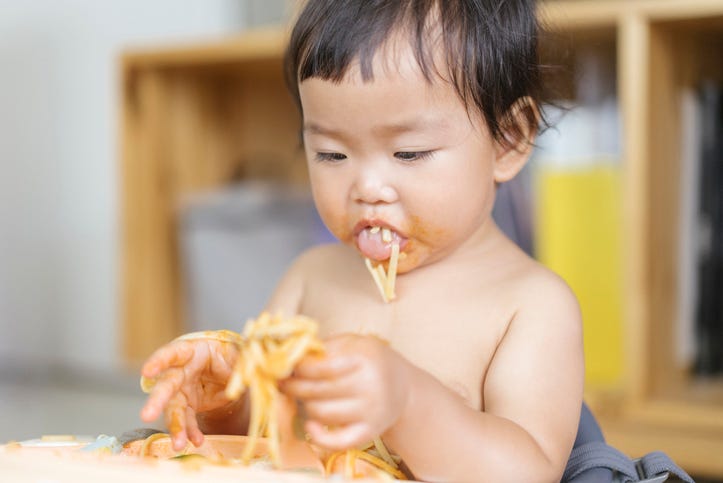There’s this misconception that we can’t trust neurodivergent children when it comes to their bodies, food, all of that, right? And it’s because we are looking at neurotypical ways of eating and showing up in this world.
You’re listening to Burnt Toast. This is the podcast where we talk about diet culture, fatphobia, parenting, and health. I’m Virginia Sole-Smith, I also write the Burnt Toast newsletter.
Today I am chatting with Naureen Hunani, the founder of RDs for Neurodiversity, a neurodiversity-informed online continuing education platform for dietitians and helping professionals. Naureen also has her own private practice in Montreal, where she treats children, adults, and families struggling with various feeding and eating challenges through a trauma-informed, weight-inclusive, and anti-oppressive approach.
I have been dying to have Naureen on the podcast for ages now. We get a question at least once a week, if not more often, about how to navigate feeding challenges with neurodivergent kiddos, with neurodivergent parents, or with a neurodiverse family where everybody’s coming at mealtime in slightly different ways. This is a topic really close to my heart personally, but not a topic where I have a lot of lived experience and expertise. So Naureen is the person we need for this conversation and I’m delighted to be having it with her.
Post-Publication Note: Some listeners let me know that it would have been helpful to start this discussion with a definition of terms. So here are some quick definitions of neurodiversity, neurodivergent and neurotypical. (These definitions are by no means definitive and many folks in the neurodivergent community have different takes. So please consider those links your starting point only, and feel free to share other resources in the comments!)
PS. Election Day Update! By the time you read this, we will have all parsed the meaning of the national races to death. (Where I am emotionally: SO relieved that Fetterman won, SO despondent that Stacey Abrams lost.) The state government elections are of course getting far less media attention but they are so crucial. Here’s the list of victories that The States Project is reporting:
Maine House: Chamber Defended!
Maine Senate: Chamber Defended!
Michigan House: Chamber Flipped!
Michigan Senate: Chamber Flipped!
Minnesota House: Chamber Defended!
Minnesota Senate: Chamber Flipped!
North Carolina House: Ground Held! Supermajority prevented!
And as for Arizona, where the Burnt Toast Giving Circle raised $28,236—the NYT still has it at too close to call as I write this. But our friends at The States Project are cautiously optimistic:
It’s still early for clear results for our close partners in Arizona but quite a few of our candidates are leading. Right now, our goal of a tie in the Senate is still on the table.
So stay tuned.
Episode 69 Transcript
Naureen
So I am a multiply neurodivergent person. I’m also a mom of two multiply neurodivergent kiddos. Both of my children have feeding differences. And professionally, I’m a registered dietitian.
Virginia
Can you talk a little bit about why neurodivergent folks may have a hard time with eating? How much of this is due to being neurodivergent—and how much of this is due to our culture’s neurotypical expectations around food and around mealtimes?
Naureen
I love that question. That is something that I have been exploring the last couple of years. How much of this struggle or difference is really related to the neurotypical expectations? Who gets to define what is and isn’t a problem?
It’s really interesting because people of all neurotypes can can have challenges when it comes to eating. We do see, however, that neurodivergent children, in general, will present with a lot more feeding differences, compared to children who are developing more typically. What we often see is selective eating, or what a lot of people call “picky eating,” and those types of feeding/eating behaviors. It could be related to sensory needs or the child’s feeding ability. But I think what harms neurodivergent children the most are neurotypical developmental milestones related to feeding and eating—the shoulds and the expectations, right?
I know, as a pediatric dietitian, this is huge. I remember talking to parents and saying things like, “By 12 months, they should be able to eat like the rest of the family and by 18 months they should be able to self feed.” And this is what we see in daycares, schools, these expectations that we have for children to develop a certain way. And when that doesn’t happen, a lot of parents struggle. Because parents are given prescriptive advice, right? So when there are differences that show up, it becomes really difficult to access support.
So, I really see this as a difference and not necessarily a problem. And that’s what I encountered also, as a parent, right? When I was struggling to feed my family, it was really difficult to find support if people didn’t fully understand what I was struggling with. I didn’t have the language and my children, of course, didn’t have the language. I think that it’s definitely a bit of both, but I do think that these milestones can can be quite damaging to children who are developing differently.
Virginia
I love the language choices you’re making. I love that you’re saying “feeding difference” instead of “feeding problem.” As someone with a kid with a lot of feeding differences, I really resonate because it just is so negative. It can feel like a problem, right? Because you’re really struggling. And people are telling you that something’s not okay. But to reframe it as a difference and not something you’re blaming your kid for, or that everybody’s doing wrong—that you are doing wrong, that the kid’s doing wrong—that alone feels like such a powerful reframing.
Naureen
Thank you. For me personally it has made a huge difference and the families that I work with feel very much affirmed by that type of language.
Virginia
So in terms of the expectations, I completely hear you on the milestones. My older daughter definitely did not eat like the rest of the family at 12 months or 18 months, or any of that. We had to throw out that whole timeline. And a lot of these expectations that are on parents today come from diet culture. What rules or misconceptions from diet culture in particular do you see getting weaponized against neurodivergent kids?
Naureen
I think diet culture impacts all children in a negative way. I think for kids who are neurodivergent or disabled, it’s particularly problematic. Because we know that diet culture is rooted in white supremacy and so is ableism, so then you’ve got these two systems of oppression coming at you.
Because when we look at what diet culture pushes—it’s not carbs, right? Carbohydrates are softer, easier to chew, easier to digest. And a lot of the foods that kids who are more sensory sensitive gravitate towards are demonized by diet culture.
There are different pieces, the ability piece, the texture perspective, and all of that and the sensory perspective can be difficult because of feeding abilities. Kids who are choosing certain foods because they’re easier to consume, often those foods—boxed foods, processed foods, packaged foods, all of those are—are demonized by diet culture. So I feel like it can become really, really messy. We see also that neurodivergent children have more feeding defenses. And when you look at the adult population, they’re also more likely to develop eating disorders later on in life, right?
Virginia
Yes and how much of that might be rooted in the shaming they’re experiencing around those food preferences?
Naureen
Absolutely.
Virginia
I think about this all the time, how the way we’ve been told to think about feeding our kids is just so wildly out of line with how our kids want and can eat. And that is true for neurotypical kids, too. But you’re right. The demonization of carbs, the demonization of processed foods—if we could get rid of those two things would make everyone’s lives so much easier when it comes to feeding kids.
So I think a diet culture version of feeding kids is pushing vegetables really hard, being anxious about carbs, that kind of thing. And there’s also the clean plate stuff, like “finish this before you can have this,” those kinds of rules. And then the model we’re given as the alternative to those rules is usually Division of Responsibility, which is the idea that parents are in charge of what foods are offered and when they’re offered, and kids are in charge of whether they eat and how much they eat. You and I have also talked about how that model doesn’t always work for neurodivergent folks. So I’d love to have you spell out what you see as limitations there as well.
Naureen
Yes, I think that DOR is something that can be adapted, right? So, if we look at, for example, the parents’ job—the what, when, and where—I find that if the parent isn’t necessarily informed about how the child’s developing, and if the idea here is to get the child to eat like the rest of the family and to appear as neurotypical as possible, that’s not going to work. I think that’s one of the reasons why DOR can fail.
I do think there is still a lot of value in the child’s jobs in feeding, in terms of deciding whether or not they wants to eat and the quantity. But it’s the what, when, and where that I feel like a lot of people struggle with. Because a parent might think that the family meal table is the best place for the child to eat, but maybe it’s not. I think this is where things get really, really messy, where I have had to sometimes even separate different family members, because it’s just doesn’t feel safe. Or what the other members are eating is just so aversive from a sensory standpoint, the smell. Plus all the demands that come with socializing, when it comes to eating. Some children don’t have the capacity at the end of the day to be able to socialize and, quote unquote, behave well and sit down and all of that.
So for some children, having a little table on the side works better. Or it could be in front of screens, even. For some children that works better because it provides self-regulation and some predictability instead of adding those social demands and all of that. With the what and when and where, we have to really look at the child’s development abilities, feeding abilities, preferences, all of that, and then make the right decision, whatever that looks like.
Virginia
On the one hand, I hope what you’re saying is giving a lot of parents a moment of real relief and giving them permission to think “Oh, I don’t have to try to execute the family meal in this rigid way. I can make more of my own choices here. And really meet my kid where they are ,as opposed to trying to drag my kid into the situation that’s not working.”
But I imagine, too, that you sometimes encounter folks who have a knee jerk reaction of, “This is too permissive. How will they ever improve if we make it this easy for them?”
I’m deliberately playing devil’s advocate here. This is not how I feel about it. But I have encountered that perspective and I wonder if you have as well. How do you talk through those concerns?
Naureen
I think it’s important to have these conversations. We live in a society that is so ableist, so we do internalize a lot of these ableist beliefs, too. But if we think of the changes that parents are making as “accommodations,” (because that’s what they really are) then it makes a lot more sense. It’s like saying, “Why are we going to put a ramp? If we do that wheelchair users will never walk.” You would never say that.
So, when we start thinking of eating in that same type of way, then it makes sense. Children want to learn. They naturally want to be like others and please their caregivers, but sometimes they just can’t eat the way the rest of the family does And so, these accommodations can be so supportive and actually help build a safer relationship with the caregiver. And that leads to healthy attachment because you’re meeting the child’s needs. Being responsive will not spoil the child. The children will still be intrinsically motivated. If they see something interesting that they want to eat, they’re going to take it. They’re not going to not eat it, because you’re offering preferred foods alongside that newer food.

Virginia
I also think, a lot of times when parents are having that reaction, we have to take a moment and say, “Well, what we’re trying to force here is not happening.” The kid is not sitting at the dinner table or not eating the vegetables, or whatever it is. So why wouldn’t we give this a shot? As opposed to just continually trying to get this round peg into the square hole or whatever metaphor you want to use.
Naureen
It’s interesting, Virginia, because a lot of parents are already implementing a lot of these strategies on their own because parents are, typically, in my opinion, quite attuned. They know what’s happening. But they just feel a lot of shame and guilt. They’ll share, “We are doing this” but feel so shameful about it. And I’m like, “This is a brilliant strategy.” So sometimes it’s really about how about maybe we remove some of that shame. How do we empower parents because they, they’re the ones who are feeding their kids, all day long. I mean, providers can be helpful and supportive for sure. But I think that at the end of the day, we need to empower parents so they can make the right choice without feeling all of that guilt and shame.
Virginia
Right, and without feeling like you’re being graded. I had a mom reach out recently, she mentioned that they were doing a lot of meals in front of the TV because that’s what’s working right now. She was like, “I just think about how our meals look like from the outside,” and I just thought, but who’s looking in your windows at night? Who is on the outside that you’re so worried is seeing this and judging you? If that’s someone in your life, who loves you, that person is not being supportive. And if it’s the sort of amorphous, larger world of Instagram and culture and whatever—none of them are invited to dinner so it doesn’t matter.
I would love to get into some practical strategies. And I’ve got a bunch of listener questions I’ve gathered that I thought we could go through. The first one says:
“I would love any practical tips for making dinners more doable. My child often only sits for three to five minutes tops. And as soon as she’s done, her younger sister is done, too. So it’s like the whole meal just kind of unravels at that point. Would a different chair or other physical support help her stay longer? Or is it just not realistic at this time of day for dinner to last longer than five minutes?”
Naureen
Definitely, seating makes a really big difference. Make sure that you have a chair that supports the child. because often what ends up happening is that if the child is not well-supported, a lot of energy is going towards sitting down, the core muscles, and then you just don’t have the capacity to engage in the fine motor skills. Sometimes that means that just having a smaller table. Like a kiddie table with smaller chairs can work well.
Virginia’s Note: For more on kids, core strength and sitting at the dinner table check out Melinda Wenner Moyer. For little ones, Yummy Toddler Food has roundups of good baby and toddler highchairs, booster seats, and toddler tables. For older kids, I hear great things about this chair and these wobble stools and like that they are both much less expensive than the beloved Stokke Tripp Trap, though you likely won’t regret that investment since it does grow with kids. If you have experience with a great kid-friendly chair or other dinner table supports you love, post in the comments!
And, of course, we need to manage expectations, too, right? We don’t necessarily want kids to be at the table for 30 minutes. That’s way too long. Sometimes getting them to move a little bit can be helpful and provide a little bit of that input because sitting down can be difficult for some children. There are weighted objects that can be placed on the lap, which can be supportive too.
Something else to consider, and I’m not saying this is the case, but this is just something that I thought about: A lot of people with misophonia have these very strong reactions when they hear other people chewing or yawning. So sometimes, later on, we find out this is why this particular kid was running away constantly.
So the first thing is chairs, seating, all of that. If that’s adjusted and the child still escaping? Well, it’s because they’re telling us something. Something’s going on, right? And so then we have to see what can we do to make this more comfortable and figure out what type of accommodations we need.
Virginia
I’m also just thinking, and I don’t know if this is that letter writers perspective, but: For kids who have had a hard time with eating and feeding dynamics, the dinner table can just be this thing, right? It can just be a trigger.
Naureen
Oh, yeah, absolutely. The fight or flight response. So if there has been trauma or a lot of pressure or other factors that we don’t necessarily think about, if there’s sensory differences, like the smell of what others are eating is a lot. I really think the child’s behavior is telling us a story. And then we need to figure out what does this really mean because children don’t just behave a certain way for no reason. There’s always a reason.
Virginia
This next question is about an adult child, which I think is interesting.
“My daughter is 23 and living with us, is autistic and ADHD. She’s not intellectually disabled, but I’d say her emotional maturity lags by a good bit. She’s very impulsive, and she also takes medications that affect appetite and has since she was five. It complicates so much about decision making and hunger and eating.
When I say impulsive: As a kid she could be sick and throw up and immediately want a milkshake and not understand why that might not be a good idea. I’m pretty sure this still holds true at 23. The hyperactivity is 24/7, so it’s her nature to wake up, walk around, eat a banana in the middle of the night, forage for breakfast number one at 5am, and then have another breakfast once I’m up. Then the meds kick in and hunger is back burnered until five, when it roars back with urgency.
I try to be weight neutral. She and I are both in bigger bodies. She’s mostly comfortable in herself, much more than most young women, I think. Although every now and then I hear an ‘I’m fat’ type of comment. But I’m often lost in the quandary of what boundaries are okay to set and what’s really not. I often say, ‘Are you sure you’re still hungry? Can you wait 10 minutes and if you’re hungry, come back and find something?’ Or ‘Hmm I think you already had two breakfasts, are you really hungry?’ And sometimes, of course, as the human mom running in the kitchen. I’m just frustrated, and ‘how can you be hungry?’ But that’s probably unfair.”
Naureen
We have to be careful because, often, neurodivergent people are more likely to get infantilized. Because 23 is an adult, right? With or without cognitive impairment. But if we want to generalize a little bit, children sometimes also have these behaviors, right? Where they’ll go and eat, and you feel like maybe it’s not the time to eat. And in this case, it seems like this person maybe has an eating pattern that wouldn’t be considered “typical.” It’s also important to remember that when we eat, we eat for different reasons. Sometimes it’s related to physical hunger, but it could also be to cope with certain emotions, it could be for stimming, because it provides certain sensory input, stimulation, self regulation, all of that. So it is important to acknowledge that whatever is going on, there is a reason behind this. There’s a purpose and it’s not just for nothing.
In this case, I would really look at what does the day look like, aside from eating. What else is happening? Sometimes mornings are really difficult for a lot of neurodivergent kids. Getting through the routine. Let’s say this particular person has to go out to work, school, whatever their routine looks like, and there’s a lot of stress. Sometimes we want a little something to soothe us. So I wonder if maybe the mornings are a little bit stressful.
It can also be related to interoception. Some people need to eat frequently throughout the day because their early satiety signals are sometimes uncomfortable or maybe even painful. So some children will eat more frequently. And that this is where you see that they’re grazing all day, and we see that in adults, too, right? I see a lot of adults that will have a lot of different small type of meals instead of sitting down because sitting down, eating a big meal can be understimulating, as well. Some even call it boring.
Virginia
My kids definitely say that.
Naureen
Another thing I find that shows up—even for people who are totally on board with weight neutrality and size diversity—sometimes we can still, as parents, struggle with internalized fatphobia. So I notice that parents who have children in smaller bodies often don’t have these types of concerns. I’ll hear things like, “He eats like all day, but he has a good metabolism.” And it’s like, no concerns, right?
I have a lot of compassion for parents who are in larger bodies and have children in larger bodies because it is violent. Our culture is so terrible, right? And so you want to protect your kids and you want to make sure that that they are accepted and all of that. So I think sometimes that shows up, too, because I do see often a difference in how parents will treat children who are in larger bodies versus smaller bodies when it comes to this type of eating pattern.
Virginia
I’m just realizing, when I read her question, my screen cut off the last line of the email. She also wrote, “And the idea of not limiting sweets is blowing my mind trying to relax around that one,” which I also have a lot of compassion for. That, of course, is a message that’s drilled into us for so long. But I think you’re completely right here that some of this anxiety about this adult child’s eating patterns, is probably rooted in some of this weight and diet culture stuff, as much as it is also confusing and discombobulating to the mom to have a kid who’s not eating during the day and wanting multiple breakfasts. It sounds like the adult child’s schedule is not lining up with what the parent wants their schedule to be.
Naureen
Absolutely.
Virginia
So there’s that conflict, which is hard, especially as you are two adults living together now. But then there’s this added layer of maybe this parent is worrying that that the adult child’s eating schedule is the reason for their body. And we need to disconnect that.
Naureen
And medications are involved. So what happens is meds really—depending on the medication—will impact appetite. So the person may not feel super hungry and then when the meds wear off—I see this all the time in my practice where parents think their kid is bingeing. No, this is just a natural response because they couldn’t eat enough earlier in the day, when the meds were really impacting the appetite. They eat smaller amounts and then at some point, they need to make up all that. So the fact that it’s happening a lot in the morning tells me that maybe this is maybe before the medication and there is more appetite. Bodies are brilliant, really.
Virginia
Yes, it seems really smart to eat a lot in the morning before the meds kick in so they have fuel to get through that long stretch when they won’t have appetite. It’s just a brilliant strategy and maybe just making some space for, “this is what she needs.” And then yes, at 5pm she’s going be really hungry again when the meds wear off. But that’s not a problem unless we label it a problem.
Naureen
Absolutely, it’s a strategy and I work with families where their kids will have two or sometimes three suppers after dinner because they really are not eating much during the day because of the medication and all the other factors.
Virginia
That’s so interesting.
Alright, another listener question:
“Recently, I’ve found myself resorting to cajoling bites for my child (age five, uses they them pronouns.) They become so absorbed in play that they forget to eat or reject the suggestion that it’s time for snack. I suspect ADHD. Sometimes hours later, they’ll completely collapse into meltdowns lasting 20 to 40 minutes. I’ll sit there begging them to just eat the snack because I know it will make them feel better. But they always refuse my initial offers. At meals they will often only nibble on things, or take three bites from a happy meal before declaring “I’m full” and playing with the toy. Now I find myself resorting to “take three bites,” as my child retorts, “I know my body and I’m not hungry.”
“I have ADHD time blindness1 and getting absorbed in tasks also makes me forget to eat. But I’ve been working on that more lately. How can I improve things for my kiddo? I’m worried about them not eating lunch at kindergarten.”
Naureen
Yes, things can get quite messy when there are multiple neurodivergent people, because you want to make sure you can eat and it’s a schedule, and routine—and remembering all of that can be hard. When kids don’t eat when it’s time to eat can be quite stressful because it’s like okay now I have to remember to offer something else, maybe 30 minutes later. It really increases the executive functioning load.
But there could be so many reasons why this type of behavior is like showing up. For some children, asking “would you like this or that?” creates a demand on kids who are more demand-avoidant or have demand anxiety. So sometimes leaving the food in the environment—and I know this is totally going against DOR again—but just very casually leaving it in the environment can be helpful. The important thing here is we’re giving frequent opportunities to kids to eat and nourish their bodies.
Sometimes that could be like, “We’ll read a book or we’ll do something that doesn’t require a whole lot of focus and then have snack in the environment.” You’re just kind of eating and just engaging in that. For some kids, that works really well because they’ll say no if it’s a demand and they don’t want to be forced into this snack time because they’re busy doing something else. But when you pair it with another activity, that works. It has to be something that doesn’t require a whole lot of focus, though, because then you forget about the snack.
Virginia
Because they’re getting so absorbed in the playing.
Naureen
Exactly. So it varies from child to child. But this is where we have to think about more creative strategies, right? And I love that child confirming “No, I know my body, I know my body.”
Virginia
We love body autonomy.
Naureen
I love it. I love it. But yeah, sometimes it’s really about creativity and letting them lead. Because again, some children won’t eat because it becomes a demand. So we have to find creative ways.
Virginia
I’m also wondering about having a snack cabinet (here’s ours) or a snack drawer that the kid can access on their own. And again, this might lead to a grazing pattern that feels counter to what you’ve been told to do. But if it lets them engage a little more directly with feeding themselves, that might help with starting to hear some of those cues, too, right?
Naureen
Absolutely.
Virginia
All right, and then this next question, oh, this is another person who has been burned by Division of Responsibility.
“The strategies you often write and talk about don’t work for us, especially Division of Responsibility. My son is eight years old and has ADHD. He takes Ritalin which suppresses his appetite, so he doesn’t get reliable hunger or satiety cues. I would like to understand how to develop body trust when you have a body and brain that you can’t always trust because of medication, and because it struggles with self-regulation, impulse control, distractibility, et cetera. How much can we expect our kiddos to get this? And how do we help them with it, especially since impulsivity is also such a thing and I don’t want to demonize or pathologize his impulses, either.”
Naureen
There’s this misconception that we can’t trust neurodivergent children when it comes to their bodies and food. And it’s because we are looking at neurotypical ways of eating and showing up in this world and then we’re comparing neurdivergent children.
Again, when there are medications involved, typically children will eat a lot more food before taking the medication and then after the medication wears off, and that is totally fine. So I’m really curious about what the eating pattern looks like and what is it telling us right? And impulsivity is very interesting. Shira Collings, one of my friends and colleagues, wrote a blog on this topic, Against Impulsivity. And it talks about how the behavior we’re seeing is a result of unmet needs.
I’m just going to make some assumptions here. Sometimes I’ll see parents say things like, “Oh, my kid is so impulsive when it comes to eating sweets or sugars or certain foods.” And I’m like, “Okay, well, I would be like that, too, if I wasn’t allowed to eat sweets and all the foods that I enjoy. I wouldn’t leave the sweet table either.” So I think often, it has to do with some type of restriction or unmet need. I think that again, we need to approach this with a lot of compassion and curiosity, and think about how these behaviors are actually serving this kiddo. Understanding the story can be really, really valuable.
Virginia
I really understand where the parent is with their initial perception, but I love this idea of reframing impulsivity as a strategy, and as a way of expressing a need, that’s really powerful.
I’m thinking about this medication piece of it, which I had not really considered before. And I’m just curious: Do you often see a lot of kids on these medications basically not eating lunch at school? I’m sure that’s worrisome to parents as well. Do you have any strategies to help with that?
Naureen
So for some kids during the day, they can’t eat all that much because of the medication. But they’re okay drinking chocolate milk. So let’s pack three of those, please. We’re going to try and get in some nourishment that way. It’s about being creative, so when it comes to certain more palatable foods that bring a lot of joy and pleasure, those are easier to consume, right? And we’re like that too, right? Sometimes it’s like you’re full, but then you see the dessert and you’re like, well, I’d love to have a piece of that. So I think sometimes it’s about that, too. So this is how you feel, but what are some foods that might be interesting or easier to take in? For some kids that can work really well. You know, liquids or more snack type of foods, right? Not necessarily like pasta in a thermos, but maybe some cheese crackers and a little bit of fruit or something. And that might work.
Virginia
I was going to ask about crunchy foods or foods that give a lot of oral feedback. Do they help ever?
Naureen
If that is what the child is into, yeah, absolutely. We all have different sensory profiles. So it’s really about being creative. And about giving more opportunities before and then after. That’s where we see parents that are concerned, “My kiddo just ate dinner and 30 minutes later, they’re hungry again. What do I do?” And I’m like, “Well, if they’re hungry, it’s because they are hungry. Let’s offer more opportunities to eat.”
So the pattern ends up looking different, and sometimes it looks very different, and it doesn’t align with how the rest of the family members are eating, and that’s okay. And that’s totally okay.
Virginia
Right, it makes sense that these are kids who probably need a good bedtime snack.
So in terms of these kids, who, at least from the parents’ perspective, don’t seem like they have strong hunger and satiety cues, or we know medication is a factor and it’s suppressing those cues: How do you talk to the kids about that? Is there language that’s helpful to a child to start to help them tune into that?
Naureen
I am very careful about teaching children hunger/fullness. That’s something that I’m actually quite uncomfortable with. I think that children, as they get older, they see how other people are eating and what eating looks like for others. I think that they make connections. They are very aware. When we start telling kids that they can’t feel fullness or they can’t feel hunger, we can run into a lot of trouble. Because how hunger and fullness show up in the body can look different for different people, depending on interoception.
So for some kids, parents will say things like, “Oh, my kid doesn’t say that they’re hungry and then they have a meltdown.” I’m like, “What else happens before that?” Those are the signals that we should be looking at. We don’t want to hyper focus on like, “hunger should be felt in the stomach” and “this is what your tummy is telling you.” Because for a lot of people, that’s not where they will feel it. They will not feel it there. They will feel it as “I can’t focus and I have a bit of a headache.” Or “I’m not feeling super good. I’m thinking about food.” Or there are other ways, right? And that looks so different. So we can’t really teach that.
Virginia
Because you don’t know what their experience is.
Naureen
We don’t know, right? And it’s so interesting because adults will tell me, “I don’t feel hunger, I don’t feel fullness.” And then a few months later, they are so aware of their eating experience. They’re like, “I can actually do my homework and I don’t feel tired. I’m in a better mood.” And like, these are your signals, right? This is what’s happening inside your body.
I think that having a flexible structure and teaching children that we can develop a flexible structure where there are multiple opportunities to feed the body can be super valuable. And that’s the work I do with adults, too. They’ll say “I don’t feel hunger,” but like, okay, well let’s see what happens in your body when we start feeding it every couple of hours. Oh, wow, I feel different. Okay, do you like that feeling? Yes, I do. Okay, let’s keep doing this. So it’s really about helping them, giving them that structure so they can take care of their bodies, right?
Virginia
And I think, too, a big part of this must also be accepting that it’s not going to look like what you the parent are expecting it’s going to look like. And it’s going to change. Kids are changing all the time. I think one of the most exhausting parts of feeding your family often, is that realization of, “This dinner that was working so well a month ago, now, everyone hates it.” Or this dinner time that we had picked based on our schedules doesn’t work because the kids are hungry an hour earlier or not till an hour later, or whatever. You’re constantly pivoting, which can be exhausting.
Naureen
It can be, absolutely. But it’s also useful data.
Virginia
I want to end on this last question because I just really love it:
“What do you think our priorities should be in terms of helping neurodivergent kids with meals? What matters most to help them build and maintain healthy relationships with food?”
Naureen
Honestly, the first thing that comes to my mind is validation. We need to validate that their experiences are real. Whatever it is they are experiencing has meaning.
I can share a little bit of my own personal experience here, as a mother who doesn’t have feeding differences, who is supporting children who do. I really had to learn to normalize their experiences. So I remember my daughter having these very unique experiences with food and then I would totally validate that. “You’re right, if you’re saying that this doesn’t feel good, then then that’s okay. That experience is real and we’re going to figure something out. If you don’t want those little pieces of whatever it is in your rice, we’re going to take that out and I’m not going to say you’re being too difficult or your brother’s eating them.”
So, really offering validation and normalizing whatever it is that is coming up. I have one kiddo who likes spices and another one who doesn’t like spices. I often have to accommodate and modify my recipes. So, that’s a lot of work for me as a neurodivergent parent. And at the same time,I also want them to feel like their bodies are not broken, right? That these experiences are their experiences. They have the right to be able to find joy and pleasure in food. And I don’t get to define what’s pleasurable, they get to define that for themselves. And that is what I think is super important.
Virginia
Yes. Empowering them to have these experiences and to know that their experiences are real and valid. That feels like everything.
Butter
Naureen
Well, I am in Montreal, and the fall weather here has been just fantastic. So I’ve just been spending a lot of time outdoors and just admiring the beautiful leaves, the colors. And that’s what I have been doing. It’s just so nice.
Virginia
Every year I think of myself as someone who doesn’t like fall because I’m really someone who doesn’t like winter. And so I get a little sad at the end of summer because it means winter is coming. And then every year I’m like, oh, wait, fall is great.
Naureen
It’s beautiful, it really is magic.
Virginia
I grew up in New England, like I’ve experienced falls for 41 years. And I don’t know why every year I’m like, Oh! It’s beautiful.
Okay. Well, my recommendation is a book I just read actually, over the weekend, while I was on a little admiring pretty fall leaves weekend away from my kids. It was great. I read the book The Heart Principle by Helen Hoang.
It’s a really delightful romance novel and it is about the experience of a neurodivergent woman. She’s actually a violin player and she’s gone through a sort of traumatic experience with her violin playing and her relationship to music. And it is a romance. There’s a delightful romance plot. But it’s also her starting to understand her her identity as an autistic person and having to come out to her Chinese American family. There are a lot of complicated dynamics. I saw the title The Heart Principle and I thought it was just going to be a fun romance novel and it absolutely was. And I was also sobbing because the story of this woman’s experience was so beautifully done. The author is herself autistic, so it’s also very much grounded in her own experiences. I just loved it. It was much more than I had expected from the very cute cover and delightful in many ways.
Naureen, thank you so much for being here! Tell listeners where they can follow you and how we can support your work.
Naureen
I have two social media accounts. For parents, I have an account Naureen Hunani Nutrition on Instagram and Facebook and then for providers It’s RDS for Neuro diversity.
The Burnt Toast Podcast is produced and hosted by me, Virginia Sole-Smith. You can follow me on Instagram or Twitter.
Burnt Toast transcripts and essays are edited and formatted by Corinne Fay, who runs @SellTradePlus, an Instagram account where you can buy and sell plus size clothing.
The Burnt Toast logo is by Deanna Lowe.
Our theme music is by Jeff Bailey and Chris Maxwell.
Tommy Harron is our audio engineer.
Thanks for listening and for supporting independent anti diet journalism. I’ll talk to you soon.















Share this post